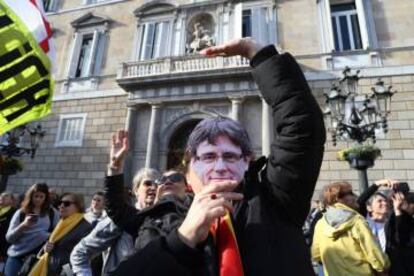Catalan secessionist leaders could be barred from office by March
Supreme Court seeks to stop Puigdemont and aides from gaining power before rebellion trial begins

The ousted Catalan premier, Carles Puigdemont, and four former government officials who fled to Belgium with him to escape a criminal investigation could soon be barred from holding public office in Spain.
The Supreme Court, which is handling a probe into rebellion, sedition and misuse of public funds by leaders of the illegal independence push, could make the ban effective by late March, according to legal sources familiar with the situation.
Nearly 30 individuals are being investigated over the Catalan secessionist bid
Spanish prosecution laws allow such a move against individuals who hold public office, have been indicted, are being sent to pre-trial detention and are under investigation for terrorism, rebellion or criminal association.
This would effectively curtail Puigdemont’s attempts at getting himself voted in as the new Catalan premier despite being a fugitive from justice and in violation of Constitutional Court orders that he must show up inside the Catalan parliament in person on the day of the vote, rather than seek a remote appointment from Brussels.
Sources at the Supreme Court said that the investigation phase of the case is nearly complete, and that Puigdemont and his aides will likely be formally accused of sedition, rebellion and misuse of public funds in connection with the independence drive – which included a referendum on October 1, the passage of self-made laws in the regional chamber, and a unilateral declaration of independence in late October.
If the current political impasse in Catalonia is not resolved by late March, these leaders could no longer bid for any government positions, or run in any subsequent elections.
Puigdemont had been hoping to get invested on Tuesday of this week, but in a surprise move, the house speaker announced that he was indefinitely delaying the session to vote in a new regional leader. This decision came shortly after the Constitutional Court had warned that any officials who aided Puigdemont in his bid to disobey the court would automatically be committing a criminal act.
The crime of rebellion is punishable with up to 25 years in prison
Section 384 bis of the Criminal Prosecution Law allows judges to disqualify public officials before a final conviction is handed down, but only if very specific conditions are met. A bill of indictment and simultaneous arrest warrant must be issued, and the crime under investigation must be one or more of the following: terrorism, rebellion or criminal association.
Accused parties who are not in detention may hold on to their posts until a verdict is handed down and all appeal procedures have been exhausted.
December election
Puigdemont secured a seat in the Catalan parliament at the regional election of December 21. So did four former government members who fled to Brussels with him – Toni Comín, Lluís Puig, Meritxell Serret and Clara Ponsatí – although the last three have given up their seats so that other party members may take them up and legally cast their votes (the Constitutional Court has prohibited long-distance voting.)
If Supreme Court judge Pablo Llarena decides to formally charge them and issue a warrant for their arrest and imprisonment, the conditions would be met to disqualify them from public office. Puigdemont could still appeal this decision before a three-judge panel within the Supreme Court.
The move would effectively curtail Puigdemont’s attempts at getting himself invested as the new Catalan premier
Judge Llarena is investigating 28 individuals over the Catalan secessionist bid. Five of them are in pre-trial custody, including Oriol Junqueras, the leader of the pro-independence Catalan Republican Left (ERC) and former deputy premier to Puigdemont. These individuals showed up for their hearings in early November and were remanded in custody. Another seven people were released on bail, including the former speaker of the Catalan parliament, Carme Forcadell, after pledging to respect Spain’s constitutional laws.
Also facing imminent disqualification is Jordi Sánchez, former president of ANC, a civil society association that actively promoted independence. Sánchez is in pre-trial detention for his role in organizing a mass protest outside the Catalan department of economic affairs, where the Civil Guard was conducting a raid ahead of the independence referendum. Protesters turned hostile and vandalized patrol cars, while officials inside the building were forced to exit via the rooftop.
Sánchez, who also earned a deputy’s seat at the December election, has been suggested within separatist circles as a possible replacement candidate if Puigdemont fails in his bid to return to power.
Reactivate warrant
The Supreme Court is planning to reactivate the European arrest warrant against Puigdemont and his aides in Brussels (see box below). The warrant will have to present strong arguments in order to prevent the host state from limiting the scope of the probe as a condition for handing over the suspects.

The trial is expected to begin around October. The crime of rebellion is punishable with up to 25 years in prison, although for such a conviction to be handed down it would have to be proved that violence was employed during the independence bid and that the accused were the direct instigators of these acts of violence.
Although the rebellion charges would be hard to prove, a conviction for seditious acts, which entails a 10-year sentence, is more probable. Evidence in the investigation includes wiretaps, a road-map detailing a plan to achieve independence by deliberately ignoring existing laws, and a handwritten agenda. Misuse of public funds involves a five-year prison term.
European arrest warrant
In December, the Spanish Supreme Court decided to withdraw a European arrest warrant against Puigdemont, amid concerns that the involvement of the Belgian judicial system could hamper attempts by the Spanish courts to try Puigdemont and his four aides for rebellion, the most serious crime for which they are being investigated.
The Spanish crime of rebellion does not have an exact equivalent in Belgium, a fact that could have seen Belgian authorities handing over the sacked politicians to Spanish authorities on charges such as misuse of public funds, but not on charges of rebellion. This in turn would have prevented the Spanish courts from trying Puigdemont and the former ministers for the crime.
English version by Susana Urra.
Tu suscripción se está usando en otro dispositivo
¿Quieres añadir otro usuario a tu suscripción?
Si continúas leyendo en este dispositivo, no se podrá leer en el otro.
FlechaTu suscripción se está usando en otro dispositivo y solo puedes acceder a EL PAÍS desde un dispositivo a la vez.
Si quieres compartir tu cuenta, cambia tu suscripción a la modalidad Premium, así podrás añadir otro usuario. Cada uno accederá con su propia cuenta de email, lo que os permitirá personalizar vuestra experiencia en EL PAÍS.
En el caso de no saber quién está usando tu cuenta, te recomendamos cambiar tu contraseña aquí.
Si decides continuar compartiendo tu cuenta, este mensaje se mostrará en tu dispositivo y en el de la otra persona que está usando tu cuenta de forma indefinida, afectando a tu experiencia de lectura. Puedes consultar aquí los términos y condiciones de la suscripción digital.










































